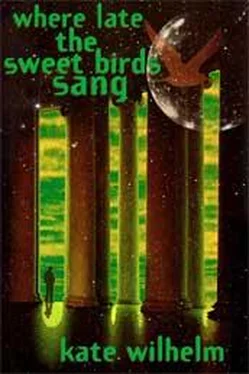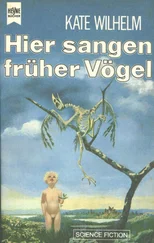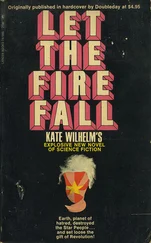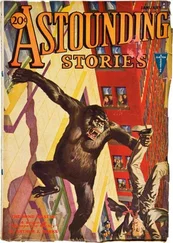He had arrived at that mysterious crossing that is never delineated clearly enough to see in advance. He sipped his martini, not liking it particularly, and knew that childhood had ended, and he felt a profound sadness and loneliness.
The Christmas that David was twenty-three seemed out of focus. The scenario was the same, the attic full of children, the food smells, the powdering of snow, none of that had changed, but he was seeing it from a new position and it was not the wonderland it had been. When his parents went home he stayed on at the Wiston farm for a day or two, waiting for Celia’s arrival. She had missed the Christmas Day celebration, getting ready for her coming trip to Brazil, but she would be there, her mother had assured Grandmother Wiston, and David was waiting for her, not happily, not with any expectation of reward, but with a fury that grew and caused him to stalk the old house like a boy being punished for another’s sin.
When she came home and he saw her standing with her mother and grandmother, his anger melted. It was like seeing Celia in a time distortion, as she was and would be, or had been. Her pale hair would not change much, but her bones would become more prominent and the almost emptiness of her face would have written on it a message of concern, of love, of giving, of being decisively herself, of a strength unsuspected in her frail body. Grandmother Wiston was a beautiful old lady, he thought in wonder, amazed that he never had seen her beauty before. Celia’s mother was more beautiful than the girl. And he saw the resemblance to his own mother in the trio. Wordlessly, defeated, he turned and went to the rear of the house and put on one of his grandfather’s heavy jackets because he didn’t want to see her at all now and his own outdoor clothing was in the front hall closet too near where she was standing.
He walked a long time in the frosty afternoon, seeing very little, and shaking himself from time to time when he realized that the cold was entering his shoes or making his ears numb. He should turn back, he thought often, but he walked on. And he found that he was climbing the slope to the antique forest that his grandfather had taken him to once, a long time ago. He climbed and became warmer, and at dusk he was under the branches of the tiers of trees that had been there since the beginning of time. They or others that were identical to them. Waiting. Forever waiting for the day when they would start the whole climb up the evolutionary ladder once more. Here were the relicts his grandfather had brought him to see. Here was a silverbell, grown to the stature of a large tree, where down the slopes, in the lower reaches, it remained always a shrub. Here the white basswood grew alongside the hemlock and the bitternut hickory, and the beeches and sweet buckeyes locked arms.
“David.” He stopped and listened, certain he had imagined it, but the call came again. “David, are you up here?”
He turned then and saw Celia among the massive tree trunks. Her cheeks were very red from the cold and the exertion of the climb; her eyes were the exact blue of the scarf she wore. She stopped six feet from him and opened her mouth to speak again, but didn’t. Instead she drew off a glove and touched the smooth trunk of a beech tree. “Grandfather Wiston brought me up here, too, when I was twelve. It was very important to him that we understand this place.”
David nodded.
She looked at him then. “Why did you leave like that? They all think we’re going to fight again.”
“We might,” he said.
She smiled. “I don’t think so. Never again.”
“We should start down. It’ll be dark in a few minutes.” But he didn’t move.
“David, try to make Mother see, will you? You understand that I have to go, that I have to do something, don’t you? She thinks you’re so clever. She’d listen to you.”
He laughed. “They think I’m clever like a puppy dog.”
Celia shook her head. “You’re the one they’d listen to. They treat me like a child and always will.”
David shook his head, smiling, but he sobered again very quickly and said, “Why are you going, Celia? What are you trying to prove?”
“Damn it, David. If you don’t understand, who will?” She took a deep breath and said, “Look, you do read the newspapers, don’t you? People are starving in South America. Most of South America will be in a state of famine before the end of this decade if they aren’t helped almost immediately. And no one has done any real research in tropical farming methods. Practically no one. That’s all lateritic soil and no one down there understands it. They go in and burn off the trees and underbrush, and in two or three years they have a sunbaked plain as hard as iron. Okay, they send some of their bright young students here to learn about modern farming, but they go to Iowa, or Kansas, or Minnesota, or some other dumb place like that, and they learn farming methods suited to temperate climates, not tropical. Well, we trained in tropical farming and we’re going to start classes down there, in the field. It’s what I trained for. This project will get me a doctorate.”
The Wistons were farmers, had always been farmers. “Custodians of the soil,” Grandfather Wiston had said once, “not its owners, just custodians.”
Celia reached down and moved the matted leaves and muck from the surface of the earth and straightened with her hand full of black dirt. “The famines are spreading. They need so much. And I have so much to give! Can’t you understand that?” she cried. She closed her hand hard, compacting the soil into a ball that crumbled again when she opened her fist and touched the lump with her forefinger. She let the soil fall from her hand and carefully pushed the protective covering of leaves back over the bared spot.
“You followed me to tell me good-bye, didn’t you?” David said suddenly, and his voice was harsh. “It’s really good-bye this time, isn’t it?” He watched her and slowly she nodded. “There’s someone in your group?”
“I’m not sure, David. Maybe.” She bowed her head and started to pull her glove on again. “I thought I was sure. But when I saw you in the hall, saw the look on your face when I came in . . . I realized that I just don’t know.”
“Celia, you listen to me! There aren’t any hereditary defects that would surface! Damn it, you know that! If there were, we simply wouldn’t have children, but there’s no reason. You know that, don’t you?”
She nodded. “I know.”
“For God’s sake! Come with me, Celia. We don’t have to get married right away, let them get used to the idea first. They will. They always do. We have a resilient family, you and me. Celia, I love you.”
She turned her head, and he saw that she was weeping. She wiped her cheeks with her glove, then with her bare hand, leaving dirt streaks. David pulled her to him, held her and kissed her tears, her cheeks, her lips. And he kept saying, “I love you, Celia.”
She finally drew away and started back down the slope, with David following. “I can’t decide anything right now. It isn’t fair. I should have stayed at the house. I shouldn’t have followed you up here. David, I’m committed to going in two days. I can’t just say I’ve changed my mind. It’s important to me. To the people down there. I can’t just decide not to go. You went to Oxford for a year. I have to do something too.”
He caught her arm and held her, kept her from moving ahead again. “Just tell me you love me. Say it, just once, say it.”
“I love you,” she said very slowly.
“How long will you be gone?”
“Three years. I signed a contract.”
He stared at her in disbelief. “Change it! Make it one year. I’ll be out of grad school then. You can teach here. Let their bright young students come to you.”
Читать дальше












